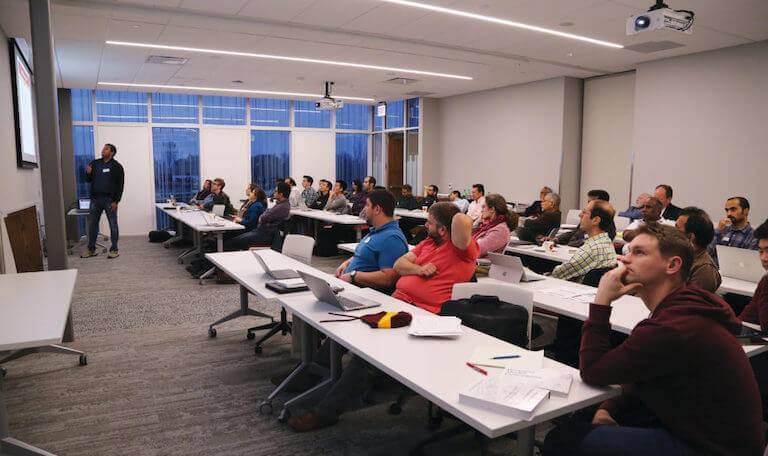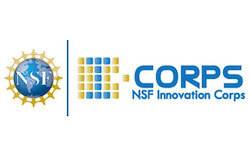Iowa State University Part of $15M Great Lakes Innovation Corps Hub
Posted Aug 25, 2021

In an effort to nurture a regional innovation ecosystem and move more discoveries from the research lab to the real world, the National Science Foundation (NSF) has established a Great Lakes Innovation Corps (I-Corps) Hub — and Iowa State University plays a key role.
The 11-university Hub is led by the University of Michigan (U-M), and it’s one of five Hubs across the country that NSF announced today as it continues to evolve the I-Corps program. Launched in 2011, I-Corps trains scientists and engineers to carry their promising ideas and technologies beyond the university and into the marketplace to benefit society.
In addition to Iowa State and U-M, the Great Lakes Hub includes Purdue University, the University of Illinois Urbana-Champaign, the University of Minnesota, Michigan Technological University, Missouri University of Science and Technology, the University of Akron, the University of Chicago, the University of Toledo, and the University of Wisconsin-Milwaukee. NSF has determined that the start date of the Hub will be January 1, 2022.
“The Great Lakes region is home to many of the world’s leading research institutions, and many of our nation’s critical industries. Our goal with this I-Corps Hub is to leverage this intellectual depth to create a lasting economic impact on the region,” said Alec D. Gallimore, the Robert J. Vlasic Dean of Engineering, the Richard F. and Eleanor A. Towner Professor, an Arthur F. Thurnau Professor, and a professor of aerospace engineering. “We’ll do this by creating new businesses, by keeping our existing companies globally competitive and on the leading edge of technology, and by developing talent that not only has technical and cultural expertise, but also an entrepreneurial mindset.”
The Impact of I-Corps
Over the past four years, an NSF I-Corps Node led by U-M has introduced the entrepreneurial mindset to over 3,000 scientists and engineers across the Midwest and beyond, and it has helped teams assess the commercial potential of nearly 1,000 technologies.
 The new Hub has set a goal of training 2,350 teams in the next five years, and sending an additional 220 teams to a more in-depth National NSF I-Corps program. In this way, I-Corps is helping to fill what Jonathan Fay, executive director of the U-M Center for Entrepreneurship, calls the “widening gap” between the cutting-edge research being done at universities and the development work of industry to turn research into societal benefit and economic gain.
The new Hub has set a goal of training 2,350 teams in the next five years, and sending an additional 220 teams to a more in-depth National NSF I-Corps program. In this way, I-Corps is helping to fill what Jonathan Fay, executive director of the U-M Center for Entrepreneurship, calls the “widening gap” between the cutting-edge research being done at universities and the development work of industry to turn research into societal benefit and economic gain.
“U.S. universities are set up to reward scientific breakthroughs, but not necessarily the hard work of turning that discovery into social or economic impact,” Fay said. “On the industry side, investing in long-range R&D is expensive with uncertain payoffs. This has led to a shift in industry away from research and toward development.”
“What I-Corps does is fill that gap by changing both the mode of thinking and the social networks of the academic community so we can maximize the benefits of publicly funded research by finding the right place within industry for a new breakthrough to take hold.”
In coastal cities, entrepreneurship and innovation often thrive organically because the sheer number of investors and innovators operating in close proximity lead to an abundance of opportunities to collaborate and pathways for developing research. The Great Lakes Hub aims to connect people at a large scale to increase the “effective density” of the Midwest’s innovation ecosystem.
A Proven Track Record of Success
Each university in the Hub already has a successful I-Corps program, and the new model will make it easier for them to network and learn from one another. Since the inception of the program at ISU in 2017, more than 90 teams and over 200 students, faculty, staff, and postdocs from all six ISU colleges and more than 25 departments have participated in the program while generating over $4 million in follow-on funding and launching at least 13 new companies. Significantly, 12 teams were accepted into the prestigious national program, each earning a $50,000 grant.
The management team behind the I-Corps Hub program at Iowa State is: Kris Johansen, associate director of external relations at the National Institute of Antimicrobial Resistance Research and Education (NIAMRRE); Guru Rao, professor emeritus of the Roy J. Carver Department of Biochemistry, Biophysics and Molecular Biology; and Craig Forney, assistant director of Licensing and Business Development for Iowa State’s Office of Innovation Commercialization. Johansen will serve as the director, recruiter and operations manager of Iowa State’s affiliate program in the Great Lakes I-Corps Hub; Rao will serve as the faculty affiliate lead for the program at ISU; and Forney will serve as staff instructor for the Introduction to Customer Discovery (ICD) Training.
“We’re excited to enter this new chapter of the I-Corps experience at Iowa State,” said Kris Johansen. “We believe being a member of the Great Lakes I-Corps Hub will open valuable new opportunities for collaboration with like-minded research institutions for our faculty and students who choose to invest their time in the I-Corps experience.”
Guru Rao added: “I-Corps is a perfect complement to Iowa State’s dual emphasis on innovation and entrepreneurship. It has been heartening and rewarding to see the great ideas that have come to fruition over the past four years, and we’re confident this next evolution in the I-Corps experience will help grow even more new discoveries into marketplace realities.”
The Fall 2021 cohort for the I-Corps Hub program at Iowa State begins October 20, 2021. Applications are open now, through October 18, 2021.
Examples of I-Corps program driven entrepreneurial successes at Iowa State University include:
- Ames-based startup, 3D Health Solutions, is focused on using and developing mini-organs derived from canine stem cells as a faster and cheaper solution to drug testing and bringing new medicines to address challenging problems in human and animal health.
- ETALYC is a software as a service (SaaS) provider that harnesses a suite of technologies under the Internet of Things (IoT) for improving traffic operations.
- Skroot Laboratory, Inc. has developed automated technologies to help researchers produce cell- and protein-based therapies, industrial enzymes and small molecules using “cell factories.”
Examples of success at other Great Lakes Hub Institutions:
- S3D at the University of Michigan. With their patented printheads capable of printing circuits, switches, antennae, and sensors onto new and existing surfaces with complex and curved geometries at less than 20 micron, this revolutionary in-vehicle sensing has the unique ability to be printed onto any surface such as seats, steering wheels, and glass, giving a boost to the auto industry.
- Adipo Therapeutics, an obesity treatment startup founded by an I-Corps team out of Purdue University. The company is developing a polymer-based nanoparticulate drug delivery system designed to convert fat cells that store energy into fat cells that burn it. Adipo Therapeutics has already secured additional grants and $1 million in private funding.
- NovoClade, out of the University of Minnesota, is developing chemical free insect control solutions, which are incredibly effective, yet doesn’t pose an additional burden on the environment. The team said that the I-Corps program helped them understand the market from the point of view of the customer, which not all scientists and engineers do due to their previous experience.
- Anemone, developed by a University of Illinois student, is a mental health crisis app that allows users to create a customized crisis plan and share it with friends, family, first responders, and mental health professionals.
